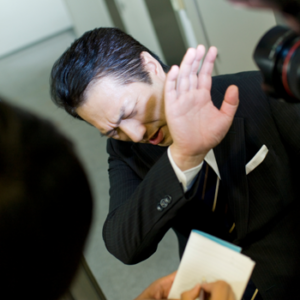 You may think saying “no comment” is a perfectly fine response to a challenging question. But in most cases, saying “no comment” is your unfortunate admission of guilt. It leaves the viewers with a sneaking suspicion about the reason for your reluctance. Many times this suspicion is amplified by your nervous tone and body language as you try to push past your questioner’s seemingly important questions to get off camera.
You may think saying “no comment” is a perfectly fine response to a challenging question. But in most cases, saying “no comment” is your unfortunate admission of guilt. It leaves the viewers with a sneaking suspicion about the reason for your reluctance. Many times this suspicion is amplified by your nervous tone and body language as you try to push past your questioner’s seemingly important questions to get off camera.
So how do you avoid saying no comment, while keeping your composure and reputation with the media? To help with this question, we’ve presented three scenarios that any CEO or media representative might encounter and give you some solid advice to tackle each. But be forewarned: nothing replaces the value of media training and practice when it comes to handling these situations.
The Ambush Interview
The ambush is one of the media’s favorite tactics to catch a high profile participant in an emerging story. They lay in wait outside your office, knowing that you have to leave the building at some point. They try to snag some great footage of your unpreparedness for the 6 o’clock news.
The wrong thing to do is to walk nervously through the ambush, pushing past the media and repeating “no comment, no comment” while they roll tape on your self-convicting demeanor. The media know that an emotional reaction makes for great footage. Asking impromptu tough questions and creating an environment of frenzy play into getting an emotional reaction from you.
The right way to handle this situation is to stay calm. Without being calm and prepared, you will react emotionally, and your “no comment” will be your indictment. Instead of saying “no comment”, approach the reporter with confidence and offer a flat, controlled reply. Offer a response such as “I appreciate your need for information, but I’m not in a position to talk at this time.” Keep walking towards your get-a-way car at the same pace you normally would each day. If you give them even the slightest “juicy” bit of footage showing unkempt emotion, a speedy step, or verbal speculation about the issue, you increase your chances of making the evening news.
The Informational Interview
The more common and less emotionally tense type of interview is the informational interview. This interview is usually scheduled beforehand, and a set of questions has been exchanged, as well as some “off the board” topics. This does not mean the reporter won’t try to engage you in some of those topics in roundabout ways.
You might have a specific agenda for this interview, like a new refinery construction project. You may be legitimately excited about the number of new jobs, technology, and impact that this project will provide, but the reporter might throw you for a loop with a question about the total cost of the project. Now, this might not be something you want to share with the public, so saying “no comment” could seem like an acceptable response. Like a moth to a flame, though, the public will flock to your “no comment” with concern and suspicion. So what are you to do?
Using Bridging in the Conversation
This type of question is the perfect setup for an interview tactic we teach in our media training called bridging. The simple concept behind this requires the right preparation beforehand, so that you’ll be able to think on your toes when these questions arise.
The simple anatomy of the bridge is: “I can’t give you ___, but I can tell you about ____”.
This simple bridge in our example might go something like: “I can’t tell you the cost of this project, but I can tell you how many jobs and opportunities this will create for our community.” Bridging allows you to return the volley of conversation right back to the interviewer, and setup the conversation that you want to have. This method avoids the “no comment” response, and keeps the conversation going in the right direction. Practice makes perfect with this tactic, so be sure to be ready for those probing questions.
The Phone Interview
The phone interview is actually just another context for both of the previously mentioned interview scenarios. Many of the same rules apply, and a few more can also be very helpful to handle these specific cases. For an informational interview, using bridging would be key to avoiding off limit topics.
If you happen to have an ambush style interview over the phone, there are a couple things to remember.
- Just because you picked up the phone does not mean you have to talk right now.
- You don’t need to give excuses, just end the conversation as quickly as possible using a line such as, “I’m sorry, really can’t do an interview right now, thank you” and hang up the phone. Anything more or less might be fuel for the fire on a hot topic.
Preparation is Key to Great Interviews
Anyway you look at it, being prepared for an interview is key to your success in front of the camera or on the phone. The Ammerman Experience has been doing live, on-camera media training for over 30 years. When the media comes knocking, you need a media training company that has experience in helping the C-suite handle the media effectively. Learn more about our media training and crisis management communication services. Remove “no comment” from your vocabulary, and replace it with some effective media training in Houston or around the world.
